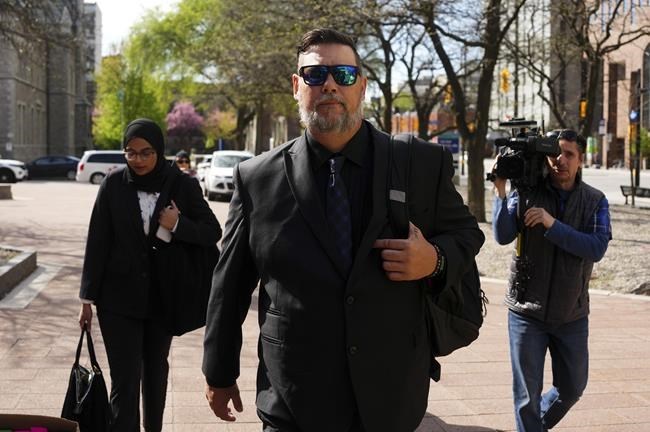OTTAWA — As his criminal trial got underway Monday, "Freedom Convoy" organizer Pat King pleaded not guilty to a list of nine charges related to the major protest that paralyzed downtown Ottawa in early 2022.
King was involved in a convoy that saw hundreds of big-rig trucks and other vehicles roll into Ottawa two years ago to protest COVID-19 public health measures and Prime Minister Justin Trudeau's Liberal government.Â
King presented himself as an outspoken leader throughout the demonstration and documented his experience with frequent livestreams on social media, Crown attorney Emma Loignon-Giroux told the court Monday.Â
Several of those videos are expected to be entered as evidence and make up a significant part of the Crown's case.Â
King offered his plea in court wearing a black suit, with about a dozen supporters in the benches behind him.
He is charged with mischief, counselling others to commit mischief, disobeying a court order, obstructing police, blocking a highway and other offences related to his role in the three-week long demonstration.
"This case is straightforward. It's not about politics. It's not a debate about the government's response to the COVID-19 pandemic," Loignon-Giroux told the court.Â
"This case is about Mr. King's conduct."
She began the Crown's case by describing life in Ottawa during the "Freedom Convoy" protest and the "severe disruptions" and "nearly intolerable" conditions residents of the city faced.
The sound of airhorns blared through the courtroom as she played an 11-minute compilation video to show the court some of the scenes she described, including streets blocked by trucks and crowds shouting "Freedom" and "We're not leaving."
The Crown's first witness, Victoria De La Ronde, answered questions about the fear and exhaustion she experienced as a blind woman living six blocks from Parliament Hill during the protest.Â
Once the protest began, she could no longer navigate the familiar streets around her home because big rigs and other vehicles blocked her way, she said.
The audible signals she used to cross the streets safely were drowned out by the blare of horns and rumble of idling engines, which kept her up all night.
She described feeling trapped in her home — a feeling that still affects her more than two years later. She has only ventured out of her home on foot by herself a handful of times since, she said.Â
She told the court under cross-examination that she is a member of a class-action civil lawsuit led by Ottawa lawyer Paul Champ against several convoy participants, which names King as a defendant.Â
Given her visual impairment, Champ came along as a friend when she was interviewed by Crown counsel ahead of King's trial, she said.Â
De La Ronde previously testified before a federal commission of inquiry into the government's use of the Emergencies Act during the protest.
Several other witnesses the Crown intends to call also testified in the criminal trial of Tamara Lich and Chris Barber, two of the most prominent organizers of the convoy.Â
None of the witnesses had any contact with King himself.
The defence also intends to call evidence in the case, King's lawyer Natasha Calvinho said Monday.Â
The court has set aside three weeks to hear the case.Â
This report by The Canadian Press was first published May 13, 2024.
Laura Osman, The Canadian Press


